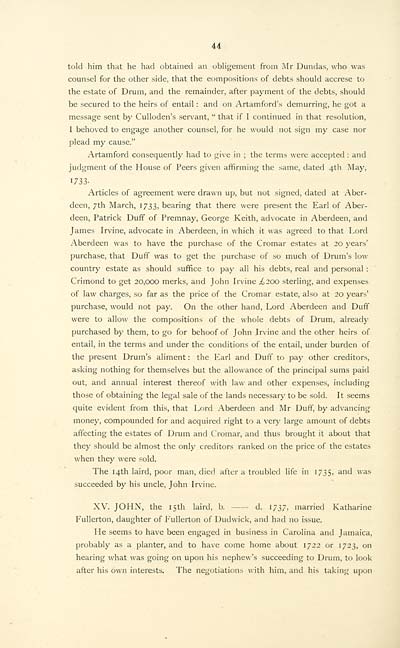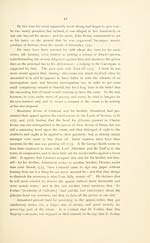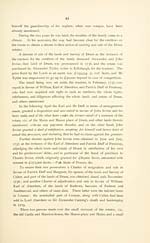Memorials of four old families
(326) Page 44
Download files
Complete book:
Individual page:
Thumbnail gallery: Grid view | List view

44
told him that he had obtained an obligement from Mr Dundas, who was
counsel for the other side, that the compositions of debts should accrese to
the estate of Drum, and the remainder, after payment of the debts, should
be secured to the heirs of entail : and on Artamford's demurring, he got a
message sent by Culloden's servant, " that if I continued in that resolution,
1 behoved to engage another counsel, for he would not sign my case nor
plead my cause."
Artamford consequently had to give in ; the terms were accepted : and
judgment of the House of Peers given affirming the same, dated 4th May,
1733-
Articles of agreement were drawn up, but not signed, dated at Aber-
deen, 7th March, 1733, bearing that there were present the Earl of Aber-
deen, Patrick Duff of Premnay, George Keith, advocate in Aberdeen, and
James Irvine, advocate in Aberdeen, in which it was agreed to that Lord
Aberdeen was to have the purchase of the Cromar estates at 20 years'
purchase, that Duff was to get the purchase of so much of Drum's low
country estate as should suffice to pay all his debts, real and personal :
Crimond to get 20,000 merks, and John Irvine ^200 sterling, and expenses
of law charges, so far as the price of the Cromar estate, also at 20 years'
purchase, would not pay. On the other hand, Lord Aberdeen and Duff
were to allow the compositions of the whole debts of Drum, already
purchased by them, to go for behoof of John Irvine and the other heirs of
entail, in the terms and under the conditions of the entail, under burden of
the present Drum's aliment: the Earl and Duff to pay other creditors,
asking nothing for themselves but the allowance of the principal sums paid
out, and annual interest thereof with law and other expenses, including
those of obtaining the legal sale of the lands necessary to be sold. It seems
quite evident from this, that Lord Aberdeen and Mr Duff, by advancing
money, compounded for and acquired right to a very large amount of debts
affecting the estates of Drum and Cromar, and thus brought it about that
they should be almost the only creditors ranked on the price of the estates
when they were sold.
The 14th laird, poor man, died after a troubled life in 1735, and was
succeeded by his uncle, John Irvine.
XV. JOHN, the 15th laird, b. d. 1737, married Katharine
Fullerton, daughter of Fullerton of Dudwick, and had no issue.
He seems to have been engaged in business in Carolina and Jamaica,
probably as a planter, and to have come home about 1722 or 1723, on
hearing what was going on upon his nephew's succeeding to Drum, to look
after his own interests. The negotiations with him, and his taking upon
told him that he had obtained an obligement from Mr Dundas, who was
counsel for the other side, that the compositions of debts should accrese to
the estate of Drum, and the remainder, after payment of the debts, should
be secured to the heirs of entail : and on Artamford's demurring, he got a
message sent by Culloden's servant, " that if I continued in that resolution,
1 behoved to engage another counsel, for he would not sign my case nor
plead my cause."
Artamford consequently had to give in ; the terms were accepted : and
judgment of the House of Peers given affirming the same, dated 4th May,
1733-
Articles of agreement were drawn up, but not signed, dated at Aber-
deen, 7th March, 1733, bearing that there were present the Earl of Aber-
deen, Patrick Duff of Premnay, George Keith, advocate in Aberdeen, and
James Irvine, advocate in Aberdeen, in which it was agreed to that Lord
Aberdeen was to have the purchase of the Cromar estates at 20 years'
purchase, that Duff was to get the purchase of so much of Drum's low
country estate as should suffice to pay all his debts, real and personal :
Crimond to get 20,000 merks, and John Irvine ^200 sterling, and expenses
of law charges, so far as the price of the Cromar estate, also at 20 years'
purchase, would not pay. On the other hand, Lord Aberdeen and Duff
were to allow the compositions of the whole debts of Drum, already
purchased by them, to go for behoof of John Irvine and the other heirs of
entail, in the terms and under the conditions of the entail, under burden of
the present Drum's aliment: the Earl and Duff to pay other creditors,
asking nothing for themselves but the allowance of the principal sums paid
out, and annual interest thereof with law and other expenses, including
those of obtaining the legal sale of the lands necessary to be sold. It seems
quite evident from this, that Lord Aberdeen and Mr Duff, by advancing
money, compounded for and acquired right to a very large amount of debts
affecting the estates of Drum and Cromar, and thus brought it about that
they should be almost the only creditors ranked on the price of the estates
when they were sold.
The 14th laird, poor man, died after a troubled life in 1735, and was
succeeded by his uncle, John Irvine.
XV. JOHN, the 15th laird, b. d. 1737, married Katharine
Fullerton, daughter of Fullerton of Dudwick, and had no issue.
He seems to have been engaged in business in Carolina and Jamaica,
probably as a planter, and to have come home about 1722 or 1723, on
hearing what was going on upon his nephew's succeeding to Drum, to look
after his own interests. The negotiations with him, and his taking upon
Set display mode to:
![]() Universal Viewer |
Universal Viewer | ![]() Mirador |
Large image | Transcription
Mirador |
Large image | Transcription
Images and transcriptions on this page, including medium image downloads, may be used under the Creative Commons Attribution 4.0 International Licence unless otherwise stated. ![]()
| Histories of Scottish families > Memorials of four old families > (326) Page 44 |
|---|
| Permanent URL | https://digital.nls.uk/95084842 |
|---|
| Description | A selection of almost 400 printed items relating to the history of Scottish families, mostly dating from the 19th and early 20th centuries. Includes memoirs, genealogies and clan histories, with a few produced by emigrant families. The earliest family history goes back to AD 916. |
|---|

